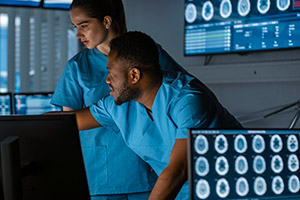Peter Bill talks about Neurophysiology
Peter is a Lead Scientist in Neurophysiology at Birmingham Women's and Children's NHS Foundation Trust.
- Programme
- STP
- Role
- Assessor
Why did you choose job/a career in healthcare science?
When I originally applied for my career in neurophysiology, I lacked knowledge on the core duties of the role. I was always interested in science and eager to have a job that directly involved working with the general public. A role in physiological science was a perfect way to combine patient-facing activities with science and technology. Despite some improvement in visibility of healthcare science services, there is still a general lack of knowledge of the career pathway and the impact on the patient journey, particularly in the smaller more specialised disciplines.
What does a typical day involve?
My job role is split into managerial/leadership and clinical roles. The interesting science part of the job is the clinical work. Throughout my years I have had the opportunity to develop the neurophysiology service here at Birmingham Women’s and Children’s NHS Foundation Trust to provide advanced services in all core areas. This includes electroencephalography (EEG) for the diagnosis of disease affecting the brain function from first diagnosis of epilepsy all the way to a highly specialised children’s epilepsy surgery service with long term EEG monitoring and invasive EEG studies.
We have a complex peripheral neurophysiology service with nerve conduction studies (NCS) and electromyography (EMG) to assess muscle and nerve disease and have a history of using advanced practice scientists in this area, including into theatre where we provide intra-operative monitoring to neurosurgical spine and brain cases to protect function and improve outcomes. Finally, we provide an advanced evoked potential service including full visual electrophysiology for neurology and ophthalmic specialities and have a highly specialised source localisation service allowing us to identify non-invasively functional areas of the brain prior to surgery to support decision-making and to help the surgeon plan the operation to restrict post-surgical deficits.
What would you say to someone thinking about a career in healthcare science?
Jump on any opportunity you have for a career in healthcare science. This diverse professional group has a huge variety of specialised services delivered in lots of different situations and places, both involving patients and public and/or samples, but all with a vital role in patient and public health. This fantastic workforce contributes to nearly all patient pathways and provide a fascinating and fulfilling career.
